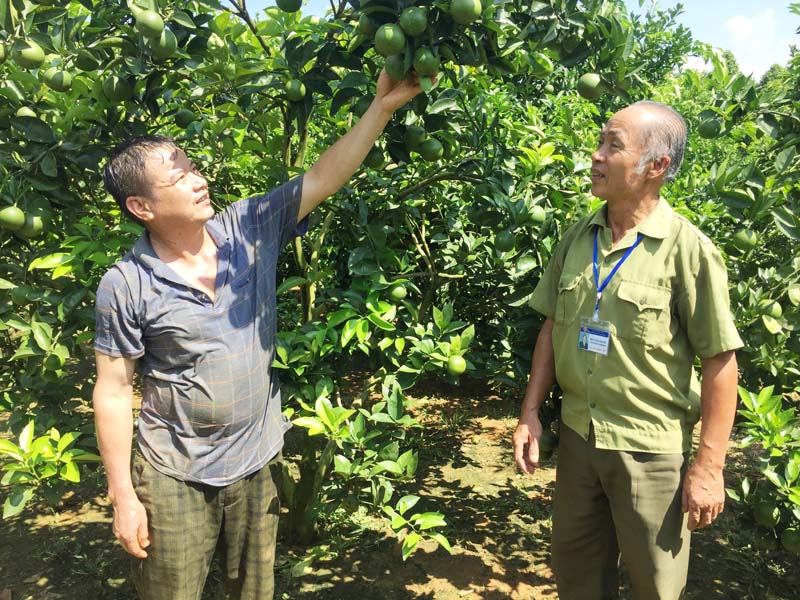
(HBO) - Prior to 2013, citrus growing is quite strange to veteran members of An Nghia Commune (Lac Son). However, up to now, citrus planting area has been expanded to nearly 20 hectares owned by veteran members. Thanks to the effectiveness of the model, the average income of veteran members reaches at 23.5 million VND / person / year, the rate of poor households reduced to 3%.

exchanging, sharing experience and techniques
of citrus planting…
Visiting Mr. Bui Van Dung's family in Vo
village, the veteran members pioneered to plant citrus trees in An Nghia
commune since 2014. At present, the area of citrus trees of Mr. Dung's family
has extended to 2 hectares, of which includes 850 original orange trees with
variety, such as: yellow, V2, Canh and 150 green grapefruit trees. In 2017, the
oranges were harvested for fortune tellers; Mr. Dung exported 20 tonnes of
fruit. The market price ranged from 13,000 to 20,000 VND depending on the types
of fruit. Thereby, his family earned over 300 million VND. Traders buying
products are mainly from provinces of Thanh Hoa, Ninh Binh, Nam Dinh, etc. In
the season of 2018, the orange garden of Mr. Dung will give the main crop; the
output is expected to be 2-3 times higher.
Currently, in order to support and assist
members who wish to develop the citrus planting model, the Veteran Association
of the commune have coordinated with other departments, organizations and mass
organizations to organize thematic workshops. This helps create a useful
playground for members to exchange information and share their citrus planting
experiences. In addition, the Veteran Association of the commune has
facilitated 10 members to access the capital from the District Social Policy
Bank with the loan amount as regulated.
Mr. Bui Van Dang, the Chairman of the Veteran
Association of the commune, said: "In the coming time, the Veteran
Association of the commune continues to propagate and mobilize officials and
members to bring into full play the effectiveness of the citrus planting
model.we expect that all the branches, organizations, unions to support capital
sources, science and technology, we are also looking for business associates to
link for product consumption. Thereby, this can contribute to increasing the
income for members, reducing the rate of poor households, promoting the local
socio-economic development.
Dao Village’s honey – a product certified with a 3-star OCOP (One Commune One Product) rating by Thong Nhat Agricultural Cooperative in Dao Village (Hoa Binh City) – is highly regarded by consumers for its quality, richness, and variety in packaging. The distinctively sweet taste of Dao Village’s honey leaves a lasting impression on anyone who has tried it.
In alignment with Project No. 07-DA/TU, issued by the Hoa Binh provincial Party Committee on November 1, 2021, Lac Thuy district has actively promoted investment and supported the sustainable development of its industrial and handicraft sectors during the 2021–2025 period. Alongside this, the district has remained committed to preserving and revitalising traditional craft villages.
Located in the northern part of Lac Thuy district, with a temperate climate and fertile soil, Phu Thanh commune has great potential and advantages in growing tea. The long-standing experience, combined with strict adherence to organic farming practices in the tea gardens, ensures that the dried tea products from Phu Thanh and Lac Thuy as a whole are sold out immediately upon production, providing a stable and prosperous life for the local people.
Amid efforts to streamline the administrative apparatus, Hoa Binh province has intensified measures to address challenges in land clearance, resettlement support, and infrastructure investment, aiming to speed up the progress of key projects.
Hoa Binh province has posted an unprecedented economic growth rate of 12.76% in the first quarter of 2025, marking its highest quarterly performance to date and positioning it as the second fastest-growing locality in the country, trailing only Bac Giang province.
Under current regulations, products in the One Commune – One Product (OCOP) programme that are rated three stars or higher must undergo re-evaluation every three months. However, in reality, some of these products fail to consistently meet the required standards, raising concerns about the sustainability of their OCOP certification. This underscores the urgent need for producers to enhance product quality and gradually develop their OCOP products into strong, marketable brands.



